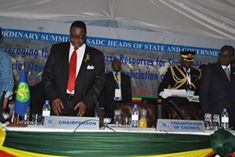1.0 INTRODUCTION
His Excellency Prof. Arthur Peter Mutharika, President of the Republic of Malawi, travelled to Victoria Falls, Zimbabwe, where he attended the 34th Summit of the SADC Heads of State and Government which was held on 17th and 18th August, 2014. The Summit was held under the theme, “SADC Strategy for Economic Transformation: Leveraging the Region’s Diverse Resources for Sustainable Economic and Social Development through Beneficiation and Value Addition.”
This Press Statement aims at giving an overview of the main outcomes of the Summit.
2.0THE SADC SUMMIT
The SADC Heads of State and Government took stock of progress achieved since the last Summit held in Lilongwe in August, 2013. It also set the stage for the SADC Region to pursue industrialization in order to maximize benefits from regional economic cooperation and integration. This is in line with the Theme which the Summit approved for the tenure of office of Zimbabwe, as well as the previous Theme during Malawi’s tenure, which was “Agriculture Development and Agro-Industries: Key for Economic Growth and Poverty Eradication”. Both themes call on the need for value addition and beneficiation in the agricultural and mining sectors.
During the Opening Session of the Summit, His Excellency Prof. Arthur Peter Mutharika delivered his Maiden Statement, as the newly elected SADC Head of State and Government, following Malawi’s Elections and his victory in May, 2014. He also delivered his Statement, as the Outgoing Chairperson of SADC, which outlined the achievements, successes and challenges during Malawi’s tenure of office.
His Excellency Prof. Arthur Peter Mutharika, reaffirmed Malawi’s commitment to revitalize the implementation of the SADC Regional Integration Agenda, aimed at achieving inclusive and equitable sustainable economic growth and development. He called upon the Region to successfully implement SADC instruments in order to transform the Region’s economies, from consuming and importing nations, to manufacturing and exporting countries, thereby improving the living standards of the people.
As the Outgoing Chairperson of SADC, His Excellency the President outlined the successes of SADC during Malawi’s tenure as follows: a) The successful implementation of the Malawi’s theme that led to the development of a SADC Strategy on Food and Nutrition Security, focusing on the empowerment of women and the youth;
b) Significant progress in the finalization of the Revised SADC Regional Indicative Strategic Development Plan (RISDP) and the operationalization of the SADC Regional Infrastructure Development Master Plan (RIDMP);
c) Continued political and security situation in the Region, including the return to constitutional normalcy in Madagascar; the stabilization of political insecurity in the Eastern part of the Democratic Republic of the Congo; and the holding of peaceful and credible democratic elections in Malawi, South Africa and Zimbabwe.
4.0HIGHLIGHTS OF THE SUMMIT
a) Status of Member States Contributions to the SADC Budget
Summit noted that out of US$35,679 million approved SADC Budget for 2014/2015 financial year, the Secretariat has this far received USD29,792 million. Madagascar will continue to honour her assessed Member States annual contribution, and the accumulated arrears amounting to US$8, 342 million, following her resumption to participate in the activities of SADC.
b) The Report of the Chairperson of the SADC Organ on Politics, Defence and Security Cooperation
Summit received a Comprehensive Report on the political and security situations in the SADC Region. Summit expressed satisfaction with the progress made in the DRC, Madagascar and Lesotho, and expressed commitment to support the peace processes. Summit especially applauded the efforts which SADC is undertaking to ensure implementation of the home-grown initiatives that have yielded positive results in the three countries.
Summit expressed satisfaction with the outcomes of elections in Madagascar, South Africa, Malawi, which were described as free, fair, and credible, by both regional and international observers.
c) SADC Strategy on Food and Nutrition Security
Summit reviewed the Region’s food and nutrition security, and noted increases in food production during the 2013/2014 growing season. However, Summit further noted that humanitarian assistance and malnutrition still remain a challenge. To this end, Summit endorsed the SADC Strategy on Food and Nutrition Security for 2015-2025, to ensure improved food availability, accessibility and utilization in a more sustainable manner, by focusing mainly on women and the youth, who are mostly vulnerable.
d) The Report of the Ministerial Task Force on Regional Integration
The Heads of State and Government received a Report on Regional Economic Integration, which outlined, among other issues, status of tariff phase-downs and intra-SADC trade. They also received Progress Report on the Tripartite Free Trade Area (TFTA) negotiations, and directed expeditious completion of the negotiations in order to pave way for the Continental Free Trade Area process.
e) Revised Regional Indicative Strategic Development Plan
Summit noted progress made in the finalization of the Revised SADC Regional Indicative Strategic Development Plan (RISDP) for the period 2015-2020. It directed that Industrial Development should be one of the key priorities in the revised RISDP, so that Member States can maximize benefits from the Region’s abundant natural and mineral resources.
f) The Roadmap for the SADC Vision 2050
Summit approved a Roadmap which will lead to the development of a SADC Vision 2050 by 2019. This Strategy will be used as a successor development blueprint to the Regional Indicative Strategic Development Plan and the Strategic Plan of Organ (SIPO).
g) The New Protocol for the SADC Tribunal
Summit considered and approved the new Protocol on the SADC Tribunal, which will facilitate the interpretation of the provisions of the SADC Treaty, Protocols and other Legal Instruments relating to issues and disputes between SADC Member States.
It also approved the establishment of an Ad-hoc Administrative Tribunal to deal with contractual issues and disputes between the SADC Secretariat and SADC employees.
h) Ebola Virus Disease (EVD) Outbreak and Other Diseases
Summit welcomed the offer by the Government of South Africa to share its technical capacity and experience on Ebola with other SADC Member States, who were urged to continue taking measures to prevent the outbreak of the Ebola Virus Disease (EVD).
Summit noted progress in the prevention and control of HIV and AIDS, TB and Malaria, all of which have shown declining trends.
i) The SADC Gender and Development Initiatives
Women Economic Empowerment
Summit directed the SADC Secretariat to set up a task force to facilitate the development of the draft Regional Multi-Dimensional Women’s Economic Empowerment Programme. This programme will aim at ensuring sustainable emancipation of women from economic marginalization and poverty.
Women in Politics and Decision Making Positions
Summit noted with concern the recent regression in women’s representation in political and decision making positions, especially by Member States that have recently conducted elections. These include Zambia (2011), Lesotho (2012), Namibia (2009), South Africa (2014) and Malawi (2014).
Summit urged the Member States to take appropriate measures to do so by, among other measures, adopting appropriate frameworks, including legislation, policy and reform of the electoral systems, to facilitate the achievement of the gender parity goal in political and decision making positions.
j) Launch of the Hashim Mbita Project Publication
Underscoring the need to appropriately honour the Founding Leaders who played outstanding roles in the liberation of Africa, both at regional and continental levels, the Summit launched the SADC Hashim Mbita Project Publication, which outlines the history of the national liberation struggles in Southern Africa.
k) Launch of the Statistical Yearbook for 2012
Summit launched the SADC Statistical Year Book for 2012, covering various subjects of the SADC Region, such as population and migration, social services, poverty and income distribution, gender equality, labour and employment, macroeconomic indicators, foreign direct investments, agriculture, food security and forestry, manufacturing, mining, energy, water and environment.
l) Appointment of the Deputy Executive Secretary Responsible for Finance and Administration
Summit endorsed the re-appointment of Ms. Emilie A. Mushobekwa, a citizen of the Democratic Republic of Congo, to the position of Deputy Executive Secretary responsible for Finance and Administration for the final term of four (4) years.
m) Legal Instruments adopted at the Summit
Summit adopted for signature the following instruments:
• Protocol on the Tribunal in the Southern African Development Community;
• Protocol on Environment Management and Sustainable Development;
• Protocol on Labour and Employment; and
• Declaration on the SADC Regional Infrastructure Development Master Plan (RIDMP).
n) Incoming SADC Chairperson and Incoming Chairperson of the SADC Organ on Politics, Defence and Security Cooperation
Summit appointed Botswana as the Deputy Chairperson of SADC. This development means that the SADC Troika of the Summit in 2014/2015 will consist of Zimbabwe, Malawi and Botswana.
Summit also appointed South Africa as the Chairperson of the SADC Organ on Politics, Defence and Security Cooperation, while Lesotho was re-appointed as Deputy Chairperson of the Organ. In this regard, the SADC Troika of the Organ will be South Africa, Lesotho and Namibia.
o) Farewell for Presidents of Namibia and Mozambique
Summit received farewell statements from His Excellency Hifikepunye Pohamba, President of the Republic of Namibia, and His Excellency Armando Emilio Guebuza, President of the Republic of Mozambique, whose presidential terms of office are nearing their end.
5.0HIGH LEVEL BILATERAL ENGAGEMENTS
On the margins of the Summit, His Excellency Prof. Arthur Peter Mutharika held discussions with His Excellency Robert Gabriel Mugabe, President of the Republic of Zimbabwe. The discussions centered on subjects of mutual interest in the two countries.
6.0CONCLUSION
The Summit was a tremendous success, as it laid down the foundations for the Region to aggressively pursue industrial development as the core priority for deeper regional cooperation and integration agenda. This will enable the Region to meaningfully benefit from market openings, through the SADC Trade Protocol and other regional and global markets for enhanced socio-economic development in all SADC countries.
His Excellency the President also used the opportunity of attending the 2014 SADC Summit, to hold bilateral meetings with some SADC Member States to further strengthen and deepen bilateral cooperation for Malawi’s mutual benefits.


.jpeg&w=60&q=100&h=60)










